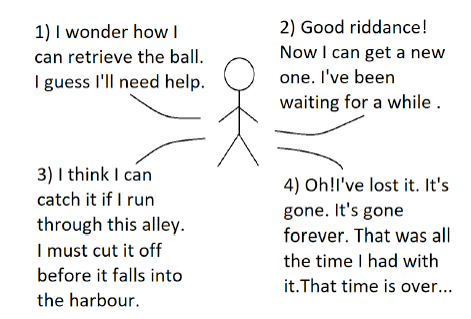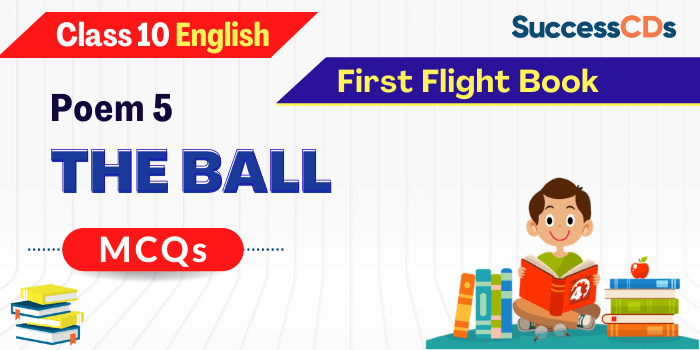“The Ball Poem” MCQs with Answers from CBSE Class 10 English First Flight Book Poem 5
The Ball Poem MCQs – MCQs of Class 10 English Poem 5, The Ball Poem by John Berryman have been compiled for students to practice. Students of Class 10 can prepare the MCQs of Poem 5, The Ball poem from NCERT First Flight book. Each question has four options followed by the correct answer. Students can also take a free test of the The Ball poem MCQs. These MCQ Questions have been selected based on the latest exam pattern as announced by CBSE.
For Correct Answers, see the end of the post. (below)
Related:
- Class 10 The Ball Poem Class 10 Summary, Explanation
- Class 10 The Ball Poem Question Answers (Important)
- The Ball Poem Character Sketches
1. What is the boy’s reaction at the loss of the ball?
A. The boy is least affected.
B. The boy is trembling and devastated at the loss of the ball which was valuable to him.
C. The boy is searching for the ball.
D. The boy asks his parents to get him another ball.
2. Where had the boy’s ball gone?
A. In the dark waters of the harbour.
B. In the deep forest.
C. In the flowing river.
D. In the basement of the building.
3. What according to the poet, the boy has to realise?
A. The boy has to realise what it means to lose a thing that is most dear to him.
B. The boy has to realise the value for money.
C. The boy has to realise not to be upset.
D. The boy should realise the importance of time.
4. What does “in a world of possessions” mean?
A. It means possessing various items.
B. It means a world full of artificial things.
C. ‘‘In the world of possessions’ means a world full of material things valued, owned and priced because of their worth.
D. The world where everyone is materialistic.
5. “He senses first responsibility”—what responsibility is referred to here?
A. The responsibility to cope with or bear the loss through self understanding on losing the ball.
B. The responsibility to take charge of his feelings.
C. The responsibility to not lose your things.
D. The responsibility to be happy in every situation.
6. What does the poet mean by the epistemology of loss?
A. It means that loss is transient.
B. It means that loss is painful.
C. It means to understand the nature of loss.
D. It means to cope with life.
7. The poet does not offer a new ball to the boy because he wants him to learn the value of _________ .
A. responsibility
B. loss
C. money
D. ability
8. While recovering from the loss, what does the boy in the ‘The Ball Poem’ realize?
A. We must learn to move on.
B. Loss is a part and parcel of life.
C. It was just a ball.
D. Both (A) and (B)
9. What does the poet mean by saying ‘money is external’?
It means that money can __________ .
A. Lead to peace and prosperity.
B. Only buy emotions.
C. Only buy materialistic things and not emotions and attachments.
D. Buy all the happiness in the world.
10. The poet does not offer to buy the boy another ball because:
A. it would be worthless
B. he should understand the meaning of loss
C. he does not have the money
D. he will lose the other ball also
11. The extract suggests that the poet is
A. an onlooker observing
B. a parent recounting the incident
C. the boy talking about himself
D. imagining the incident
12. The poet seems to have indicated the merry bouncing of the ball to
A. create a sense of rhythm in these lines.
B. support the happiness of the experience of playing.
C. contrast with the dejected feeling of the boy.
D. indicate the cheerful mood of the boy.
13. Merrily over- there it is in the water!
Choose the situation that corresponds to the emotion behind the exclamation mark in the poem.

A. option 1
B. option 2
C. option 3
D. option 4
14. The poem begins with a question. Based on your reading of the poem answer. The speaker
A. wants the boy to answer the question.
B. expects the passers-by to respond.
C. is looking for answers in a self-help book.
D. is thinking to himself.
15. “An ultimate shaking grief fixes the boy” The poet uses the word ‘ultimate’ to describe the boy’s reaction.
Pick the meaning that DOES NOT display what, ‘ultimate’ means in the context given.
A. consequent
B. final
C. conclusive
D. fateful
16. Pick the option that lists the boy’s thoughts, matching with the line- As he stands rigid, trembling, staring down.

A. Option 1
B. Option 2
C. Option 3
D. Option 4
17. “All his young days into the harbour where
His ball went.”
Choose the option that lists the meaning of ‘harbour’ as used in the line.
Noun:
(1) a place on the coast where ships may moor in shelter.
(2) a place of refuge.
Verb:
(3) keep (a thought or feeling, typically a negative one) in one’s mind, especially secretly.
(4) shelter or hide (a criminal or wanted person).
A. Option 1
B. Option 2
C. Option 3
D. Option 4
18. Why does the speaker choose not to intrude? This is so because the poet
A. knows that it would embarrass the boy in his moment of grief.
B. feels that it’s important that the boy learn an important life lesson, undisturbed.
C. realises that he doesn’t have sufficient funds to purchase a new ball for the boy.
D. Experiences a sense of distress himself, by looking at the boy’s condition.
19. Identify the poetic device used.
“Merrily bouncing down the street”
A. Metaphor
B. Alliteration
C. Repetition
D. Imagery
20. Identify the poetic device used. “No one buys a ball back”
A. Metaphor
B. Alliteration
C. Repetition
D. Imagery
21. Who is the poet of the Ball poem?
A. Leslie Norris
B. John Berryman
C. Carolyn Wells
D. Robert Frost
22. What is the boy playing with?
A. bat
B. ball
C. car
D. bus
23. Where does the ball go?
A. drain
B. well
C. house
D. water
24. What does a ball cost?
A. 5 dimes
B. 10 dimes
C. 1 dime
D. 4 dimes
25. How does the child react at the loss?
A. stands rigid
B. trembles
C. stares
D. all of them
26. According to the poet, what is the child learning?
A. to bear loss
B. to take care of things
C. to be responsible
D. to be careful
27. Does the poet condole the boy?
A. can’t say
B. yes
C. no
D. All of them
28. Why does the poet decide not to condole the boy?
A. He is busy
B. He is indifferent
C. It will be of no use
D. He is happy
29. Name the literary device used in “Merrily bouncing, down the street, and then Merrily over — there it is in the water!”
A. Metaphor
B. Simile
C. Alliteration
D. Anaphora
30. Name the literary device used in “And no one buys a ball back.”
A. Metaphor
B. Simile
C. Alliteration
D. Anaphora
ANSWER KEY
| 1 | B | 16 | D |
| 2 | A | 17 | A |
| 3 | A | 18 | B |
| 4 | C | 19 | D |
| 5 | A | 20 | B |
| 6 | C | 21 | B |
| 7 | B | 22 | B |
| 8 | D | 23 | D |
| 9 | C | 24 | C |
| 10 | A | 25 | D |
| 11 | A | 26 | A |
| 12 | C | 27 | C |
| 13 | C | 28 | C |
| 14 | D | 29 | D |
| 15 | C | 30 | C |
- Click here to take a free test of MCQs of Class 10 The Ball Poem from First Flight book.
CBSE Class 10 English First Flight Book Poems MCQs
|
|
|
|
Important Videos Links
Also See:
Class 10 English Syllabus
Character Sketches of Class 10 English
CBSE Class 10 English Lesson Explanation, Summary
CBSE Class 10 English Important Questions (Chapter wise)
CBSE Class 10 English MCQs
Class 10 English Complete Study Guide
Class 10 English First Flight book Prose word meanings
Class 10 English First Flight Poems word meanings
Class 10 English Footprints without Feet word meanings
List of Poetic Devices in Class 10 Poems (Poem-wise)
10 Important Poetic Devices for Class 10
